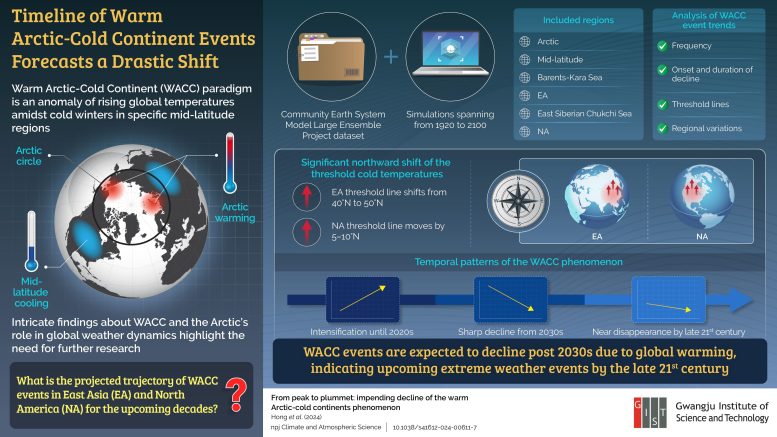
The frequency of Warm Arctic-Cold Continent events is anticipated to increase until the 2020s, but is expected to decrease after the 2030s, influencing weather patterns worldwide.
The Copernicus Climate Change Service reported that February 2024 was the warmest February ever recorded globally. However, North America, Asia, and parts of Europe experienced record-breaking cold temperatures. In some places, such as China’s Mohe and Russia’s Yakutsk, temperatures dipped to the life-threatening lowest levels. Alarmingly, this juxtaposition of increasing temperatures amidst extreme coldness pushes the future of our planet’s climate into uncertainty.
This paradoxical situation is captured by the Warm Arctic-Cold Continent (WACC) phenomenon, where warm Arctic temperatures lead to sea-ice decline and cold blasts across specific mid-latitude regions. The Arctic’s rapid warming indicates global climate change. However, as global warming and the Arctic’s temperature keep increasing, it is unclear how WACC events will unfold in the coming decades.
Recent Research Findings
To bridge this gap, a research group, led by Professor Jin-Ho Yoon and including Ph.D. student Yungi Hong, both from the School of Earth Sciences and Environmental Engineering at Gwangju Institute of Science and Technology, Korea, has recently investigated the dynamics and evolution of extreme winter weather events—technically known as WACC. Using simulations of climate datasets, mainly obtained from the Community Earth System Model Large Ensemble Project, they forecasted the trajectory of WACC events in East Asia and North America, spanning from 1920 to 2100. The study’s findings were recently published in the journal npj Climate and Atmospheric Science.

Explaining their study, Prof. Yoon emphasizes, “The WACC pattern has significantly influenced winter climates, but what we see currently is merely the start of a drastic shift.” The research team found that despite global warming, WACC events have continued to intensify until the 2020s.
Prof. Yoon points out, “These events will sharply decline post-2030s. Yet, this decline does not mean reduced extreme weather events in the future. Instead, winters will get warmer as global warming intensifies. Although cold snaps will occur less frequently, they may have more severe consequences when they do happen.”
Long-Term Forecasts and Community Impact
This declining trend will likely continue until the WACC phenomenon almost disappears by the late 21st century, bringing new extreme weather events.
These findings reshape our understanding of the WACC events and highlight the need to update climate models for accurate predictions, enhancing preparation and response strategies. The findings also resonate with the hardships faced by communities worldwide, especially those in regions historically affected by the WACC.
With the drastic shift in the WACC trajectory lurking closer, immediate action is thus needed to refine global climate strategies and reassess how societies will prepare and adapt. In this regard, Mr. Hong says, “Understanding the impact of the drastic shift in WACC events and devising adaptation and mitigation strategies determines the future of our winter climate, and it’s a stark reminder of the complexity of climate systems and the unexpected outcomes of climate change.”
Overall, this study is a compelling call for communities, policymakers, and scientists to act. It is needed, now more than ever, to collaborate and adapt as we navigate the path to resilience against climate change!
Reference: “From peak to plummet: impending decline of the warm Arctic-cold continents phenomenon” by Yungi Hong, S.-Y. Simon Wang, Seok-Woo Son, Jee-Hoon Jeong, Sang-Woo Kim, Baekmin Kim, Hyungjun Kim and Jin-Ho Yoon, 11 March 2024, npj Climate and Atmospheric Science.
DOI: 10.1038/s41612-024-00611-7
2 Comments
An interesting hypothesis, which, unfortunately, seems to rely on models of questionable veracity. Furthermore, they chose to use the improbable RCP8.5 scenario that has been questioned on the basis of available resources to support “Business As Usual.” Interestingly, the link provided, prominently displays another related study (Cohen, et al., 2023) entitled “No detectable trend in mid-latitude cold extremes during the recent period of Arctic amplification.” It seems to say that there is no empirical evidence to support the modeling results of increased cold Winter weather. I guess we will just have to wait to see how things turn out.
People keep talking about global average temperatures when things like this indicate that the distribution of heat is a key factor. And FWIW, there’s more longwave radiation when heat is concentrated (and therefore temperatures are higher) than when the heat is more widely distributed (and temperatures more evenly spread).